| | September 2024 • Issue No. 20 |
| The Latest at Harvard Law School's
Food Law and Policy Clinic |
| 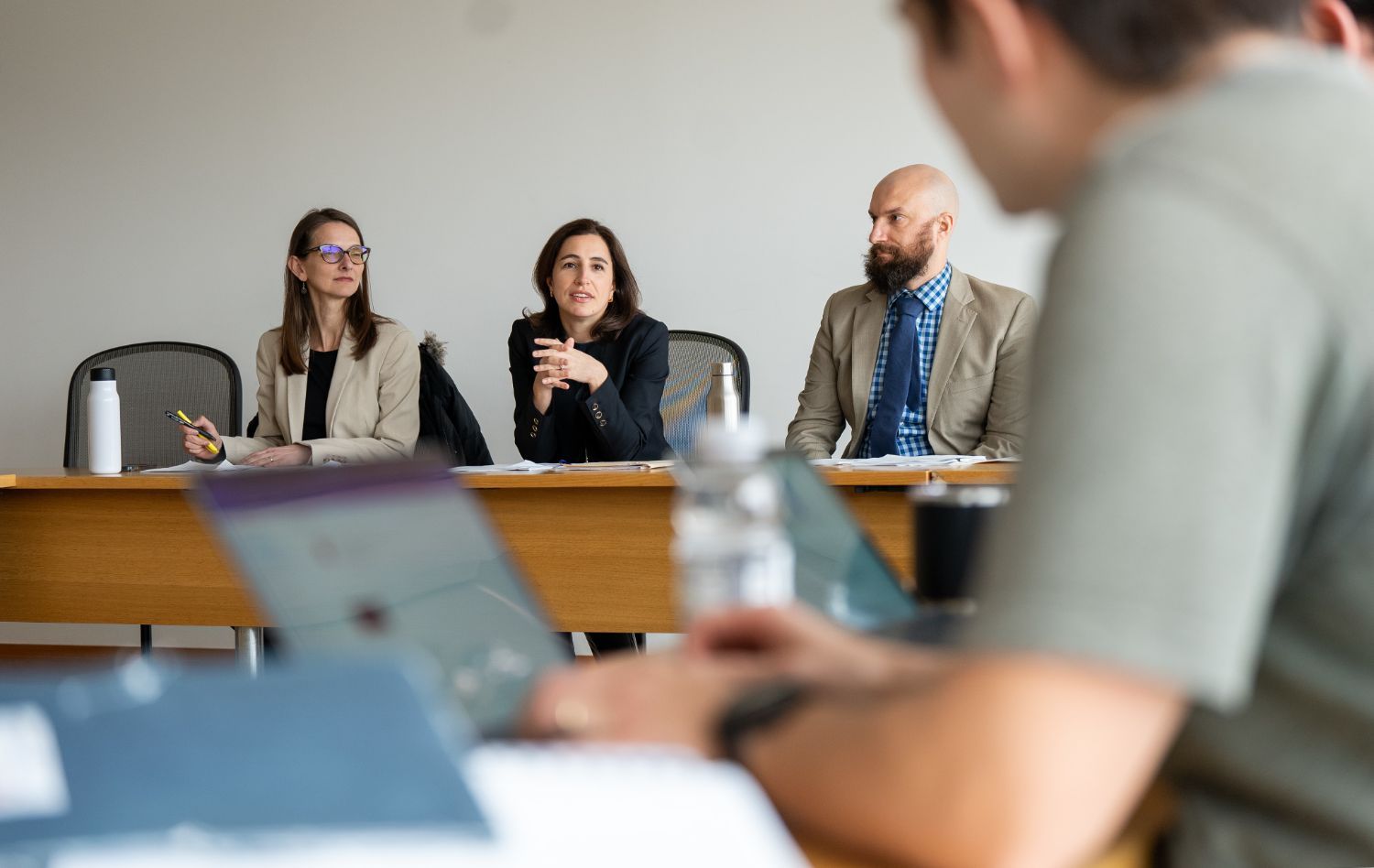 | It is the beginning of another school year at Harvard Law School and there is a palpable excitement in the air as we engage with our new students and kick off new or continue ongoing projects at the Food Law and Policy Clinic (FLPC). We’re gearing up to leverage increasing energy around new food laws and policies that better sustain our food system both in the US and around the world. We are also continuing to respond to challenges impacting how our food shapes the environment, health, and social equity, including by promoting good food procurement policies and perennial agricultural practices, which are among the most beneficial practices in terms of sustainability and ecosystem benefits. Our work in the coming semester will also build off FLPC’s many exciting efforts that have been underway in recent months. There are several new developments on our global food policy work through The Global Food Donation Policy Atlas, including the publication of new topical issue briefs and the expansion of our work to new countries like Vietnam. We are also seeing major opportunities for change domestically, including through a new U.S. National Strategy for Reducing Food Loss and Waste and Recycling Organics and through our work with the Zero Food Waste Coalition. Another area of focus this fall has been our work on food access and nutrition, including a new focus on values-based procurement in Food is Medicine interventions. We also have been involved in new research and efforts to improve the safety and quality of the food supply for everyone - including through rethinking the ways that the US regulates and periodically reviews chemicals added to the food supply. The new academic year also highlights a growing interest amongst students in the field of food law and policy. The National Food Law Student Network continues to provide students with incredible resources and opportunities to learn more about working in this space, and we at FLPC continue to benefit from new insights and expertise as we work with clinic students, interns and fellows to advance our mission. Read on for more details, insights, and updates on our work and the field. Please also stay engaged with us by subscribing to our listserv and follow us on social media. With excitement for all that this year will bring,  Emily Broad Leib,
Faculty Director, Food Law and Policy Clinic (FLPC)
Faculty Director, Center for Health Law and Policy Innovation (CHLPI) |
|
|
|
|
| | FLPC Welcomes New Staff, Scholars & Fellows |
| Jian Yi, Senior Fellow, U.S. - China Food Systems Jian Yi, an independent filmmaker and food activist, joined the Food Law and Policy Clinic as Senior Fellow, U.S. - China Food Systems, in July 2024. Jian is the founder and president of Good Food Fund, a leading initiative in China’s food systems transformation, whose Mama’s Kitchen project was named one of the ten global Top Visionaries by the Rockefeller Foundation’s 2050 Food Systems Prize. |
|
|
| Alice Bryk Silveira, Visiting Scholar Alice Bryk Silveira is a Visiting Scholar at the Food Law and Policy Clinic. Alice is a licensed lawyer from Brazil, holding a Law Degree from Pontifícia Universidade Católica do Rio Grande do Sul and an LLM in International Human Rights Law from Tel Aviv University. |
|
|
| Kristen McEnroe, Clinical Fellow Kristen McEnroe joined FLPC in August 2024 as a Clinical Fellow. Kristen returns to FLPC after working with the clinic while pursuing her J.D. Her portfolio currently focuses on strengthening international food donation policies and advancing Food is Medicine initiatives. |
|
|
| Akif Khan, Clinical Fellow Akif joined FLPC in August 2024 as a Clinical Fellow. Akif is most passionate about legal and policy work focused on waste reduction, resource circularity, and environmental, social, and economic sustainability. |
|
|
| Jeffrey Verly, Finance Manager Jeffrey Verly joined CHLPI in April 2024. He graduated from the University of Massachusetts Boston in 2019 with a Masters in Finance, building upon his earlier achievement of earning a Bachelors in Finance from Lasell University. With over 4 years of experience in non-profit research finance, Jeffrey has honed his financial expertise and demonstrated his commitment to making a positive impact through his work. |
|
|
| | | 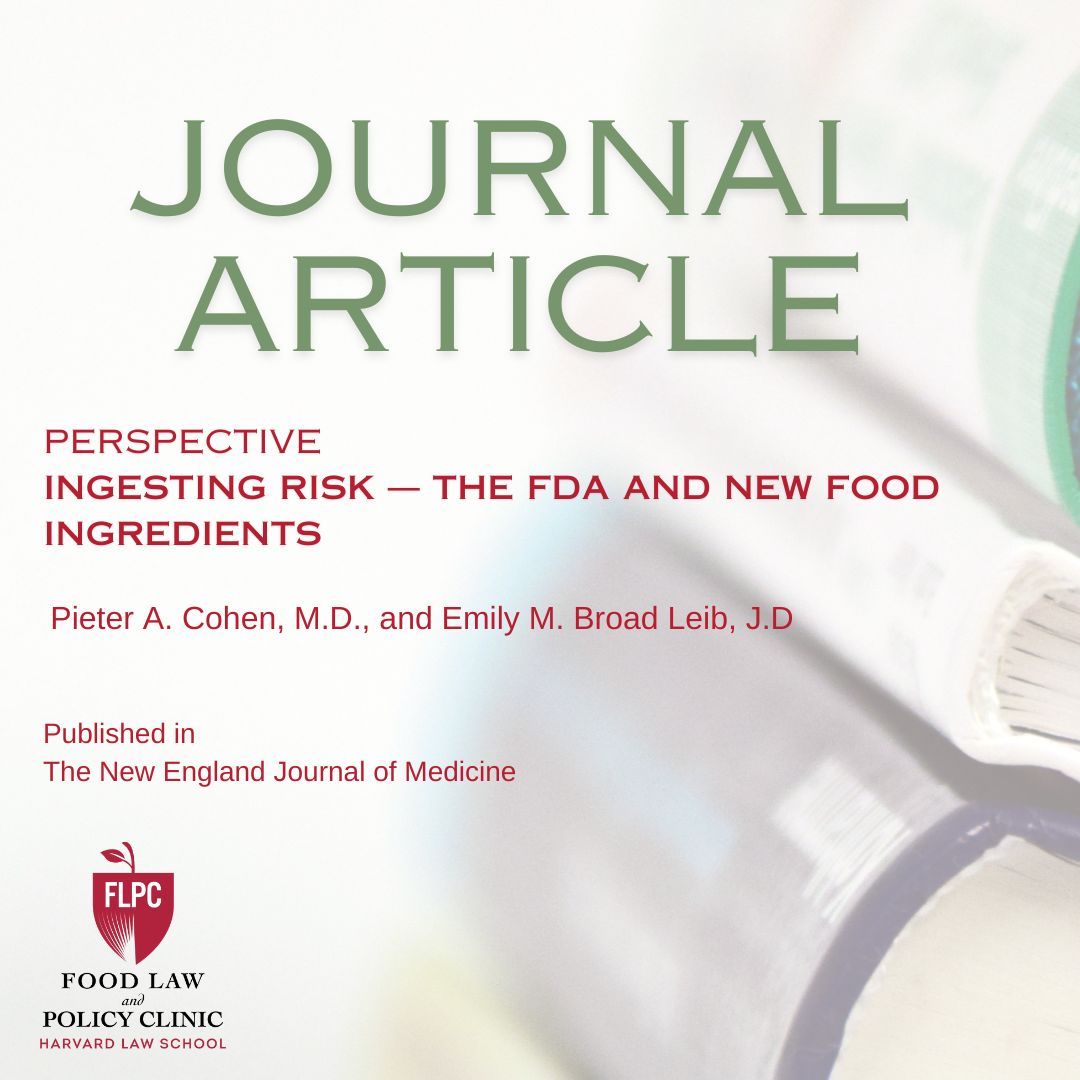 | Ingesting Risk — The FDA and New Food Ingredients
In this New England Journal of Medicine Perspective, Emily Broad Leib and Pieter A. Cohen describe the process by which food additives that are “generally recognized as safe” — a determination that can be made by manufacturers — aren’t required to be approved by the FDA. This system could pose a threat to public health. |
| 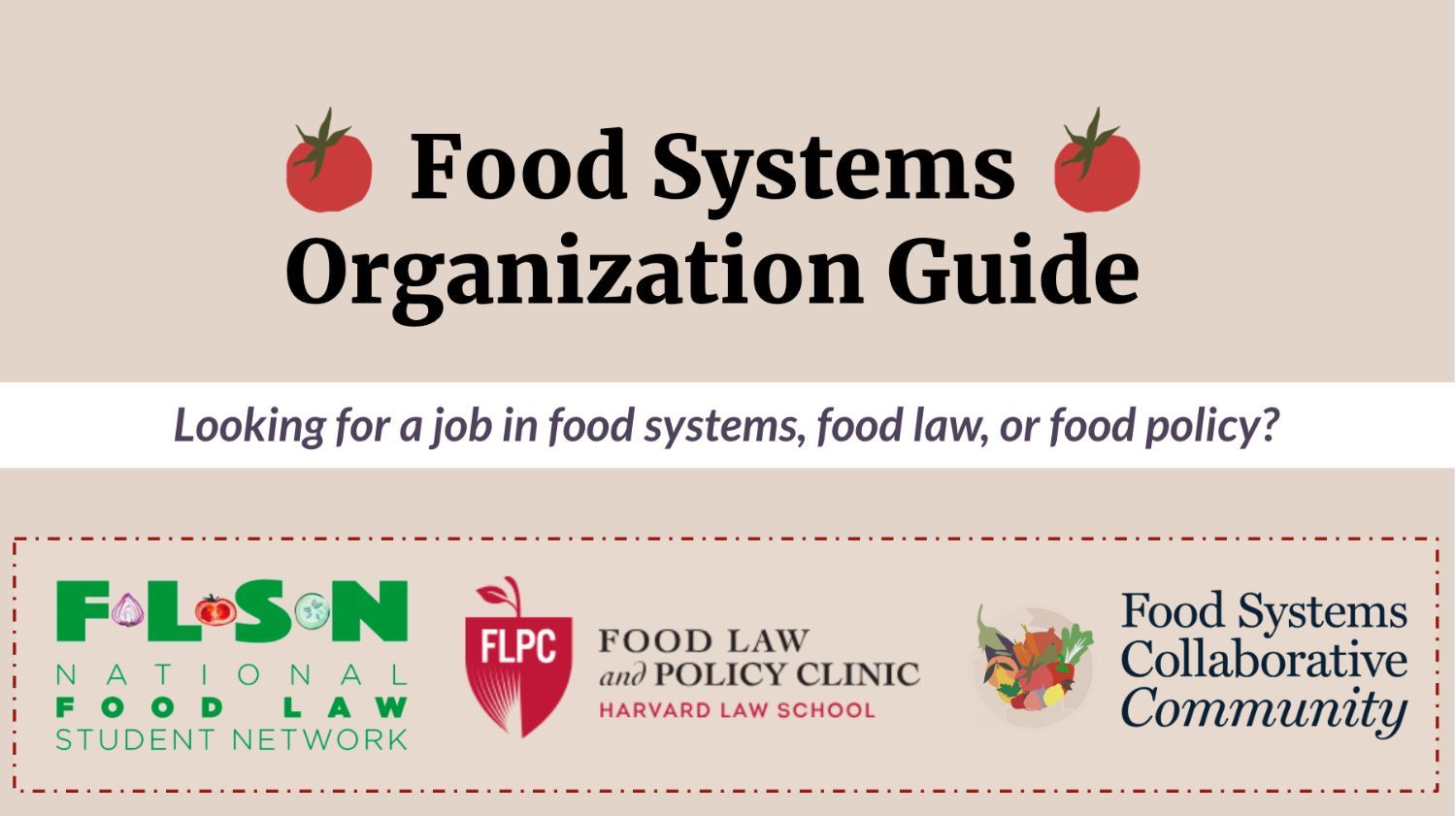 | Career Guide: Food Systems Organization Guide FLPC, the Food Systems Collaborative Community, and the National Food Law Student Network, collaborated to launch this directory of more than 220 organizations shaping the food system. The directory, which was made available in March 2024, allows students and professionals seeking employment opportunities in the food system, food law, or food policy to search and filter organizations by location, interests, and sector. |
| 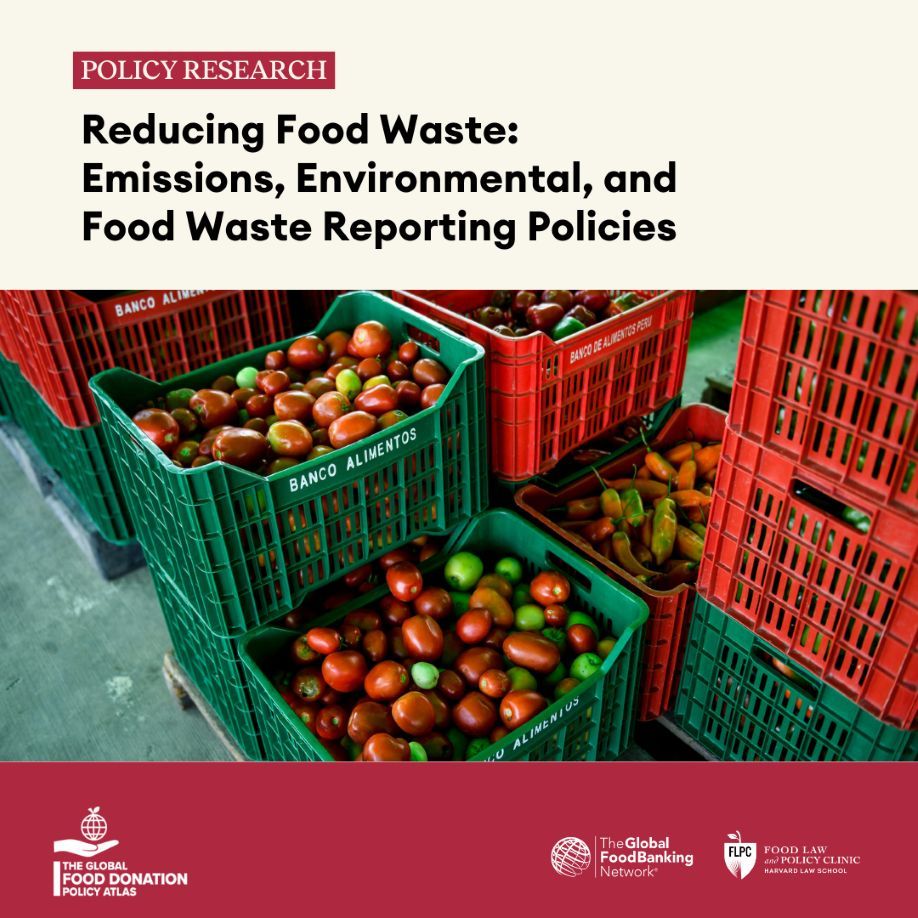 | Reducing Food Waste: Emissions, Environmental, and Food Waste Reporting Policies This report, published in April 2024, highlights policies around the world that are creating transparency around the volume of food waste generated to identify opportunities to reduce waste and increase food donation. Produced by FLPC and The Global FoodBanking Network, with support from the Walmart Foundation and Lineage Foundation for Good, the report is also intended to promote clear and consistent reporting and help entities navigate reporting standards. A corresponding expert panel discussion on national strategies can be viewed here. |
| 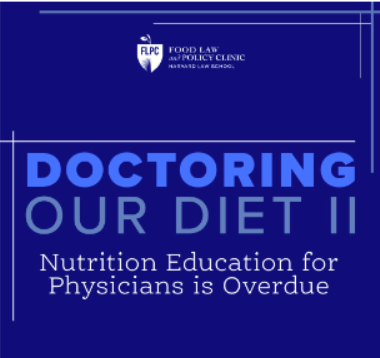 | Doctoring our Diet II As an update to FLPC’s original 2019 Doctoring our Diet publication, FLPC partnered with the Teaching Kitchen Collaborative to publish this report which highlights the positive steps that the federal government and others have taken to increase nutrition education for healthcare providers. The report also identifies opportunities for the government and others, like accrediting bodies, to build on this momentum. This research was supported by the Vitamix Foundation. |
| 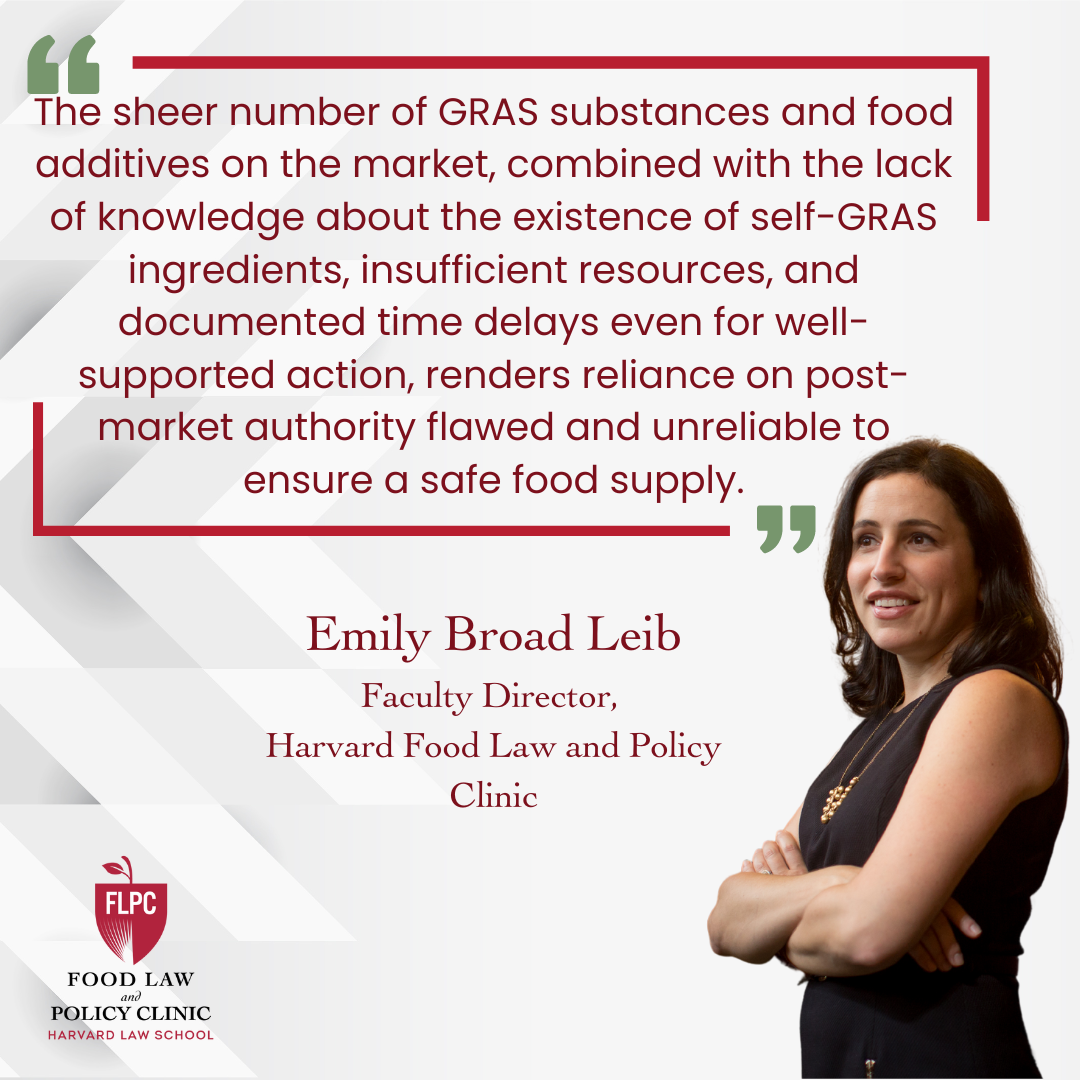 | Regulation of Added Substances in the Food Supply by the Food and Drug Administration Human Foods Program The Food and Drug Administration (FDA) evaluates the premarket safety of ingredients regulated as food additives but allows the food industry to self-regulate and determine which substances to classify as generally recognized as safe (GRAS) based on undisclosed data and conclusions that the FDA never sees. A recent court decision codified these gaps in the FDA’s current approach, leaving states to try to fill the regulatory void. The authors of this piece argue that the FDA and Congress should consider several policy options to ensure that the FDA is meeting its mission to ensure a safe food supply. |
| 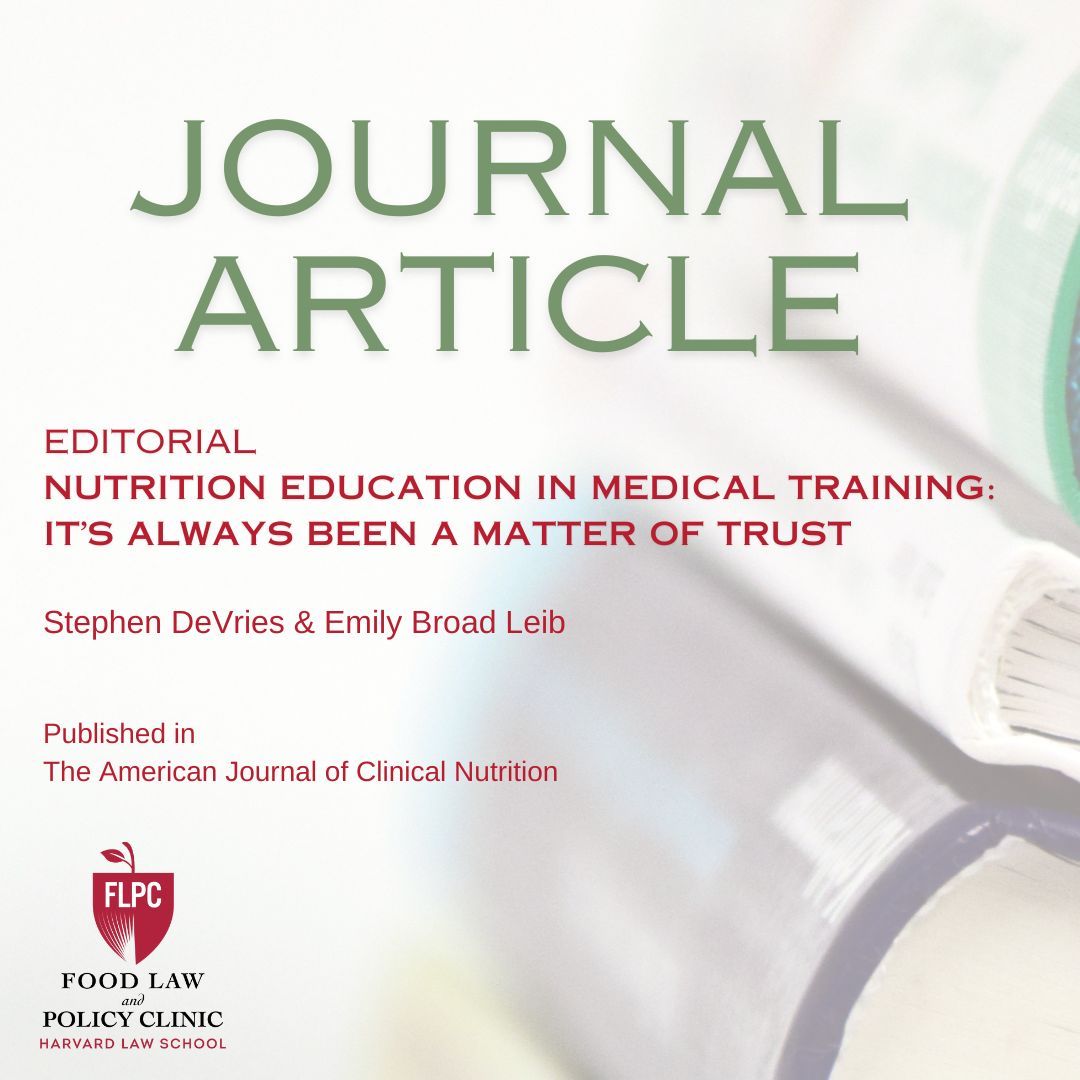 | Nutrition Education in Medical Training: It’s Always Been a Matter of Trust When it comes to nutrition, how justified are patients in their trust that physicians will have the knowledge to counsel them and make appropriate referrals? Surveys of medical students, graduate medical trainees, and practicing physicians consistently report insufficient nutrition training and a uniformly low level of confidence to meaningfully discuss nutrition with their patients. In this article, Emily Broad Leib and Stephen Devries note that nutrition education in medical training has to do with fulfilling the public trust. |
|
|
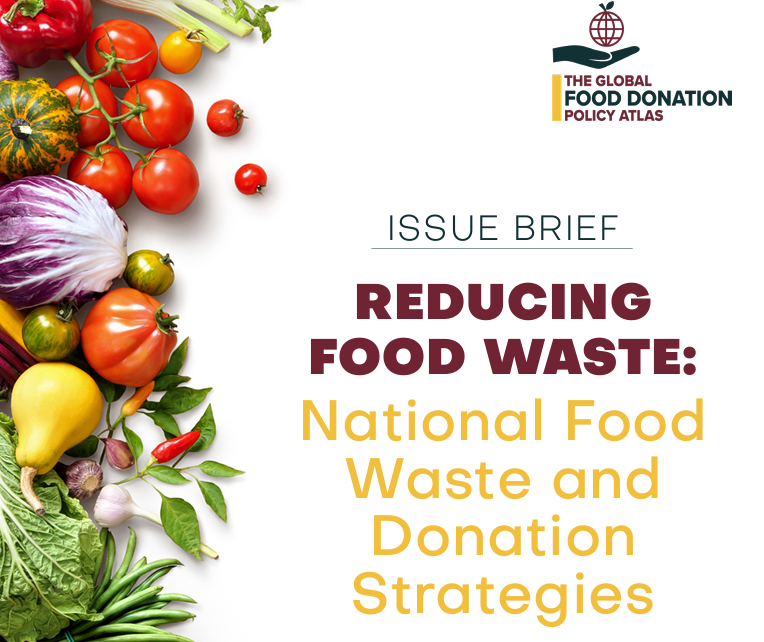 | Reducing Food Waste: National Food Waste and Donation Strategies National strategies are a tool that governments can use to align public policy, private sector activities, and drive behavior change to meet food waste reduction goals while also ensuring that safe, surplus food makes it to those in need. This report, published in April 2024, by FLPC and The Global FoodBanking Network, with support from the Walmart Foundation and Lineage Foundation for Good, includes recommendations to support the adoption of ambitious and effective national strategies to address food loss and waste. A corresponding expert panel discussion on national strategies can be viewed here. |
| 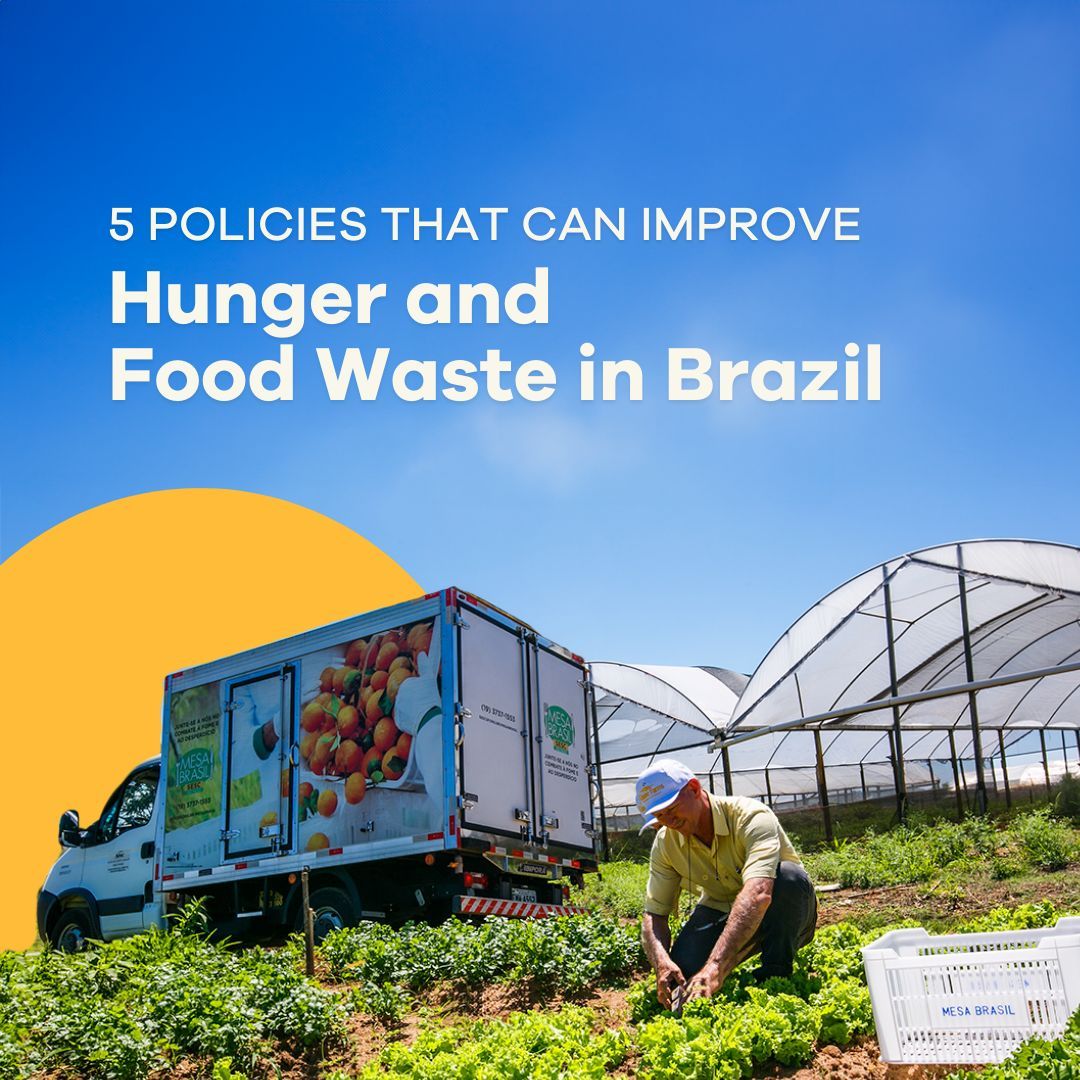 | Global Food Donation Policy Atlas Adds Brazil In partnership with Sesc Mesa Brasil, the largest private food bank network in Latin America, FLPC and The Global FoodBanking Network released new research and analysis of food donation laws and policies in Brazil along with recommendations on how legislators can reduce food waste, feed people experiencing food insecurity, and mitigate climate change. The research, released in February 2024, is now part of The Global Food Donation Policy Atlas, which analyzes laws and policies affecting food donation in 24 countries. The project is supported by the Walmart Foundation and Lineage Foundation for Good. |
| 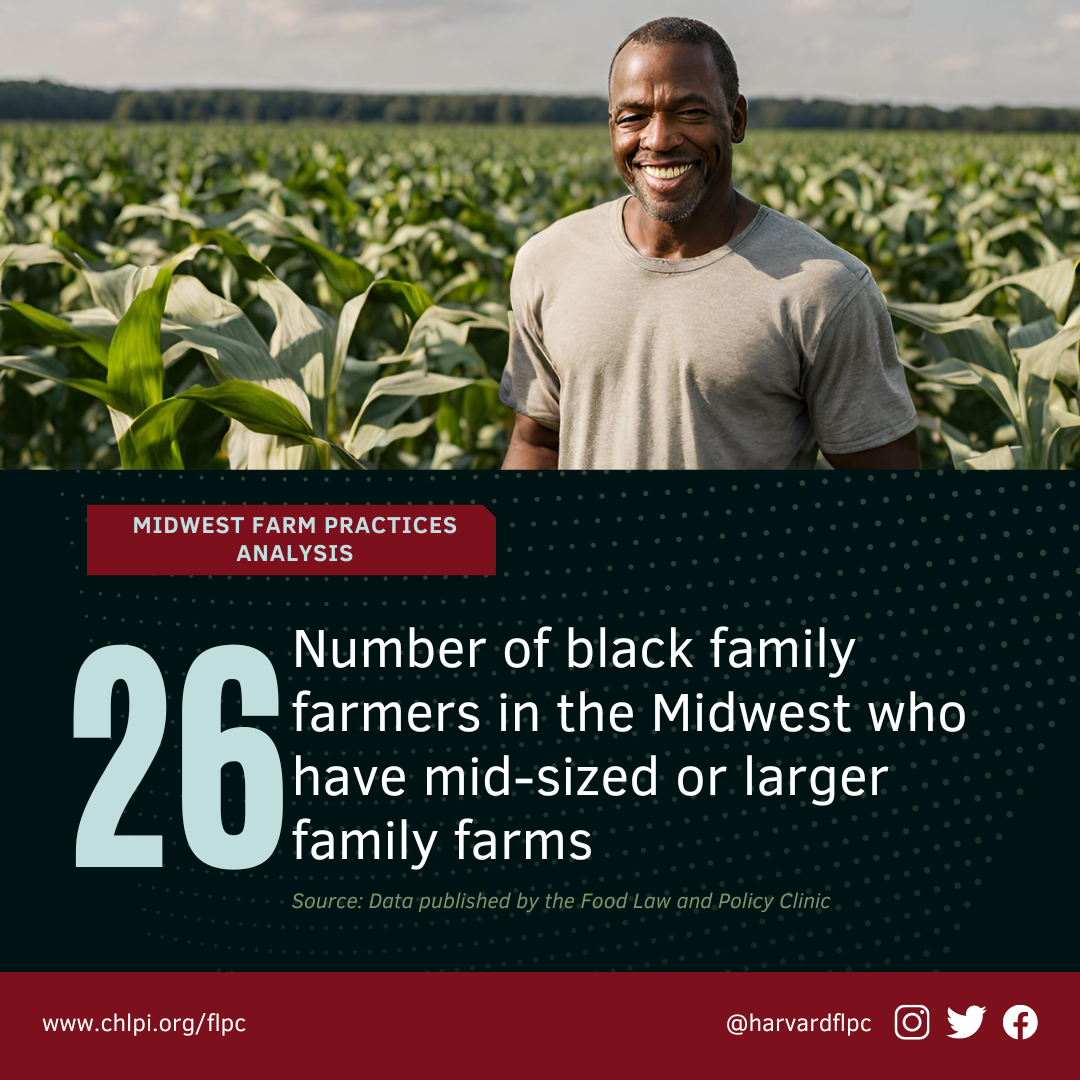 | More than CAFOS and Corn FLPC visiting scholar Nathan Rosenberg and co-author Bryce Stucki released this January 2024 report analyzing new data on BIPOC farmers, farmworkers, and agriculture outcomes in the Midwest. During the corresponding webinar moderated by FLPC Faculty Director Emily Broad Leib, the authors highlighted important trends and shared how researchers and advocates can use the data featured in the report. |
| 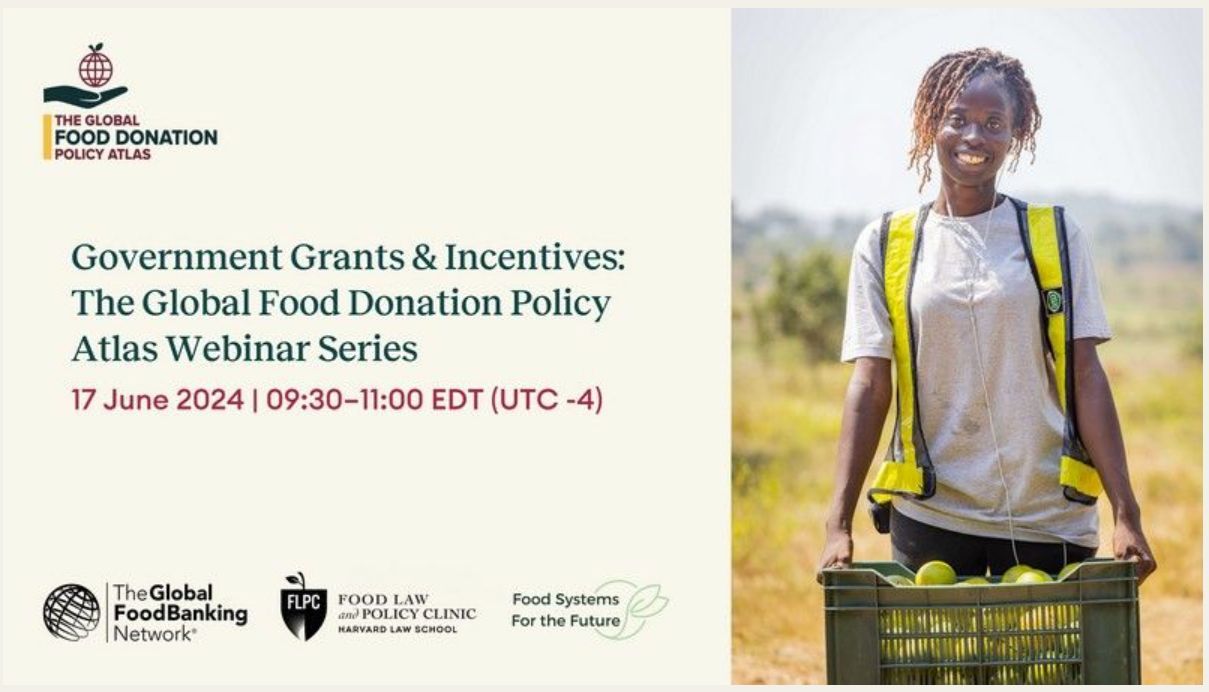 | Promoting Food Donation: Using Government Grants and Incentives to Increase Food Donation This report, published in August 2024 by FLPC and The Global FoodBanking Network, with support from the Walmart Foundation and Lineage Foundation for Good, includes recommendations to support national and local grants and incentives to scale food donation, especially in countries where tax benefits are insufficient or where limited infrastructure hinders food recovery. A corresponding expert panel discussion on grants and incentives can be viewed here. |
| 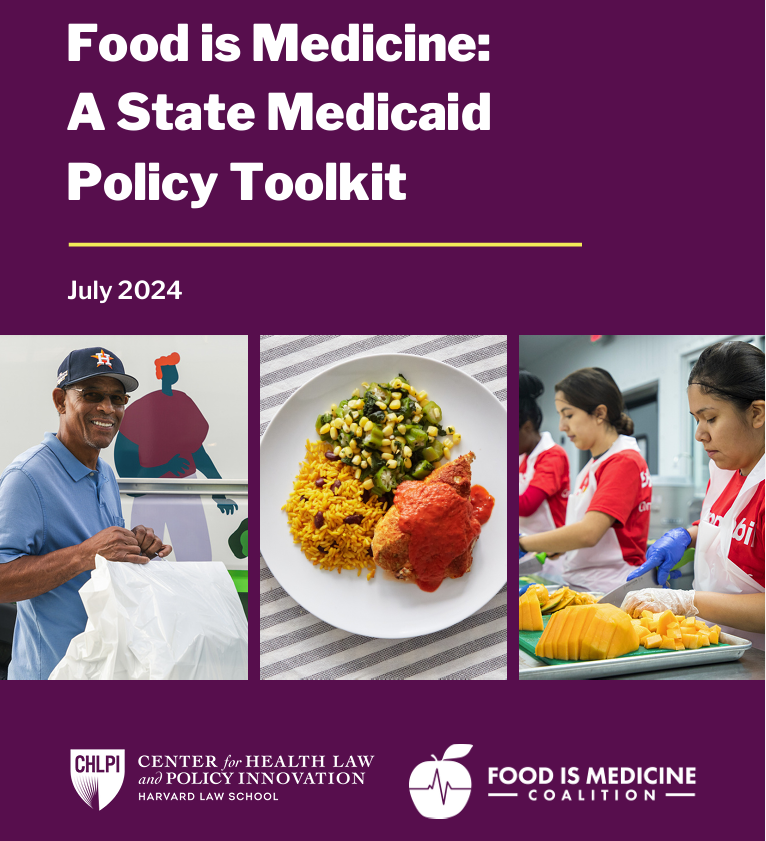 | Food is Medicine State Medicaid Toolkit The purpose of this Toolkit is to build upon CMS’s 2023 guidance by providing a roadmap by which state officials can identify the most feasible and impactful approaches to address patient nutrition needs in their state Medicaid and CHIP programs. |
|
|
|
|
| | | 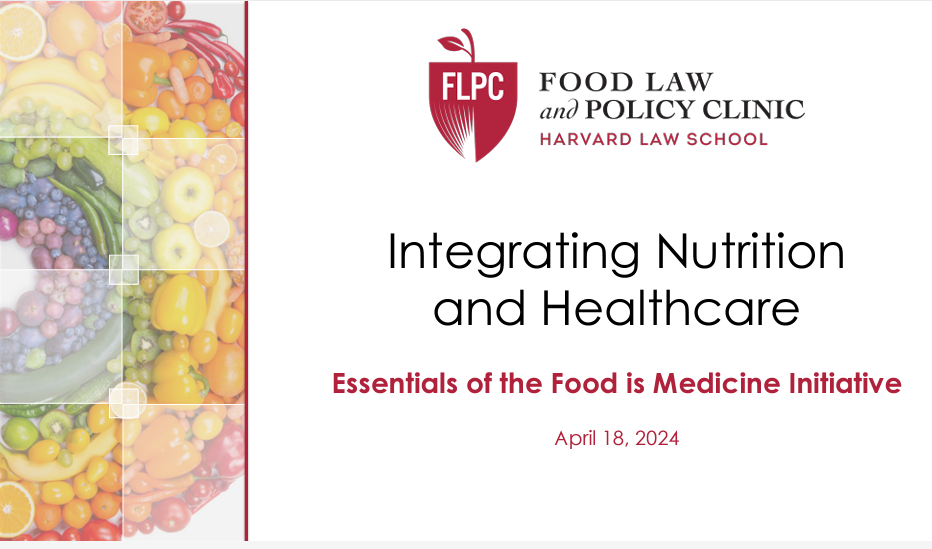 | Integrating Nutrition and Health Food is Medicine initiatives bridge the gap between our healthcare and food systems, connecting the crucial role of nutritious food in preventing and managing diet-related conditions. In the first of four webinars on “Upstream Approaches in Cancer Prevention,” FLPC clinical student Meghana Iragavarapu and Clinical Instructor, Heather Latino, shared how Food is Medicine programs contribute to better health outcomes, especially in communities with limited resources and increased disease burden. |
| 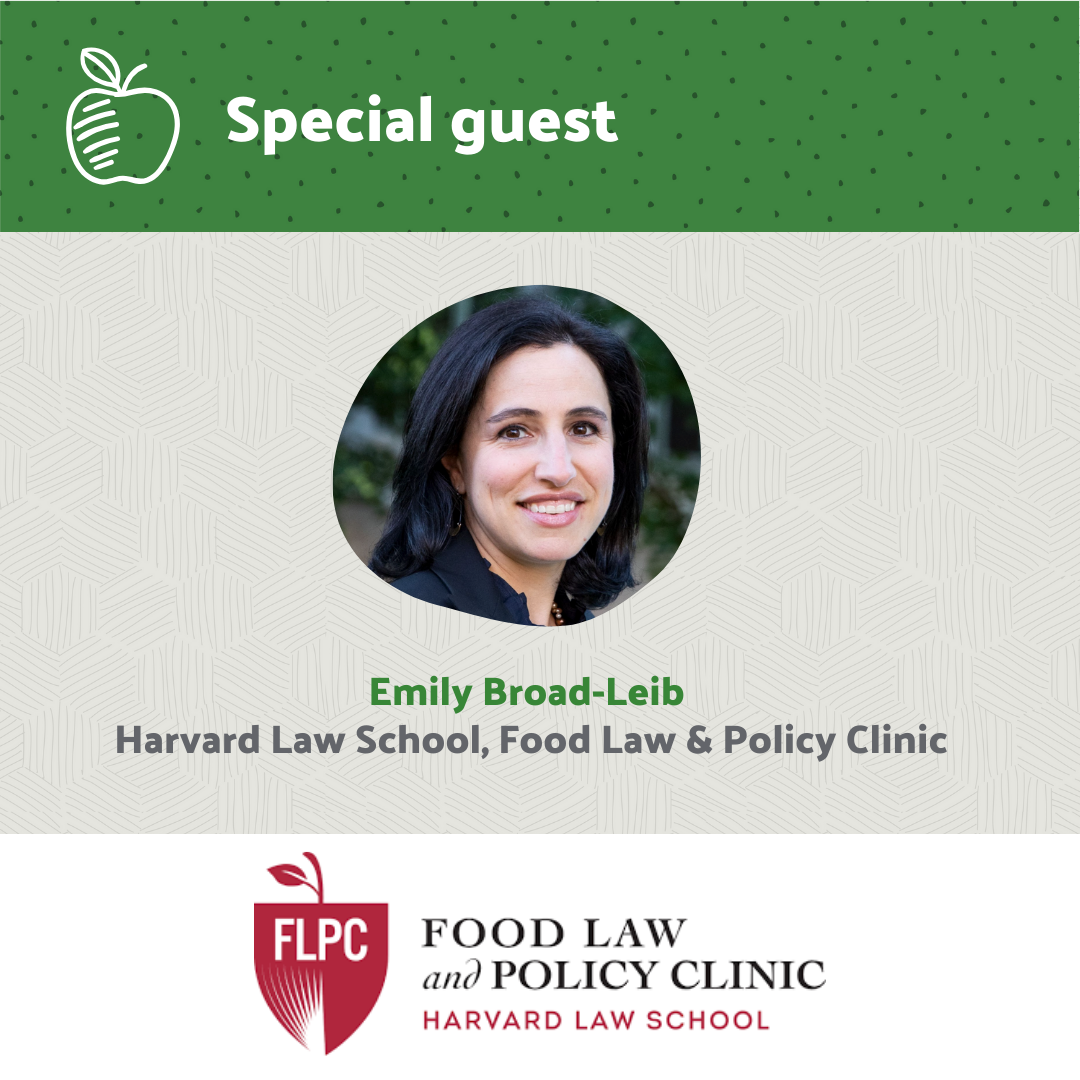 | Feeding Hungry Minds: Child Nutrition Policies and School Food In March 2024, FLPC Faculty Director Emily Broad Leib discussed the impacts of current policies, challenges, and opportunities to improve child nutrition in school food programs during the first of a three-part webinar series on school foods, hosted by the Chef Ann Foundation. |
| 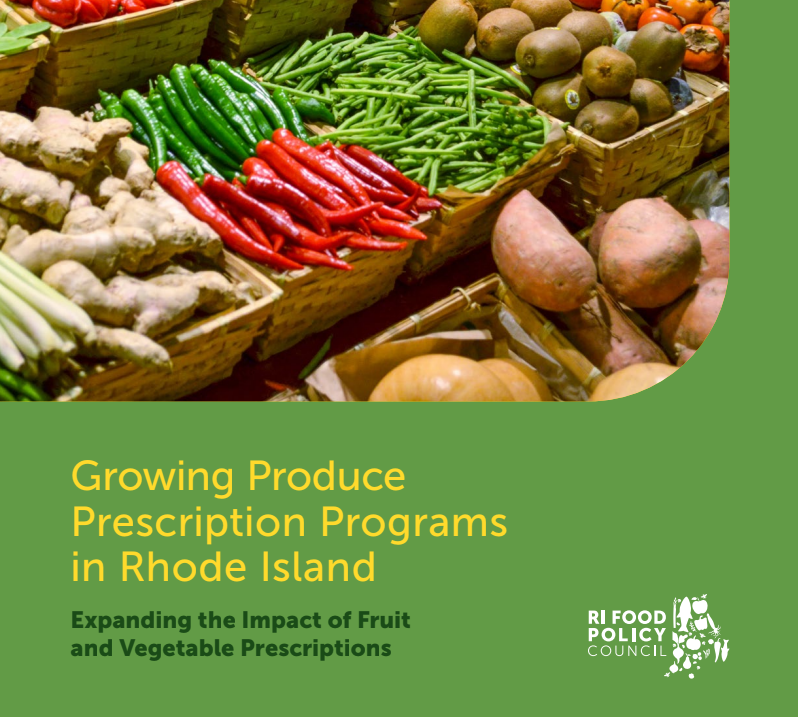 | Growing Produce Prescription Programs in Rhode Island In February 2024, FLPC Clinical Instructor Heather Latino presented at a summit hosted by the Rhode Island Food Policy Council discussing how the state could actualize its vision for making produce prescriptions available to all food insecure Rhode Islanders who are experiencing diet-related health conditions. |
|
|
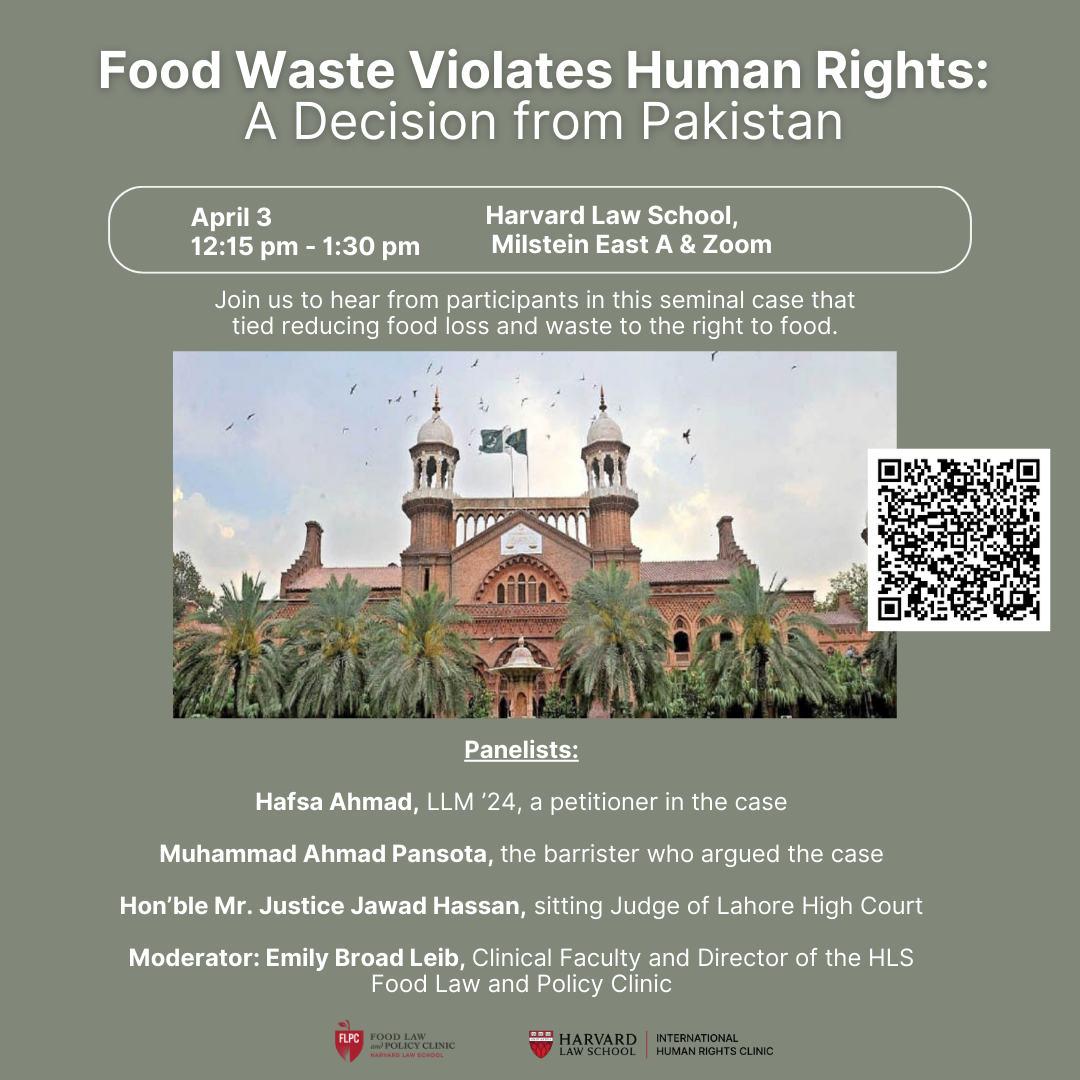 | Food Waste Violates Human Rights: A Decision from Pakistan In April 2024, FLPC brought together litigants and the judge from a seminal case in Pakistan recognizing the connection between food loss and waste and the right to food. Panelists included the petitioner who filed the case, the barrister who argued the case, and the sitting judge on the Lahore High Court who heard the case and issued this groundbreaking decision. |
| 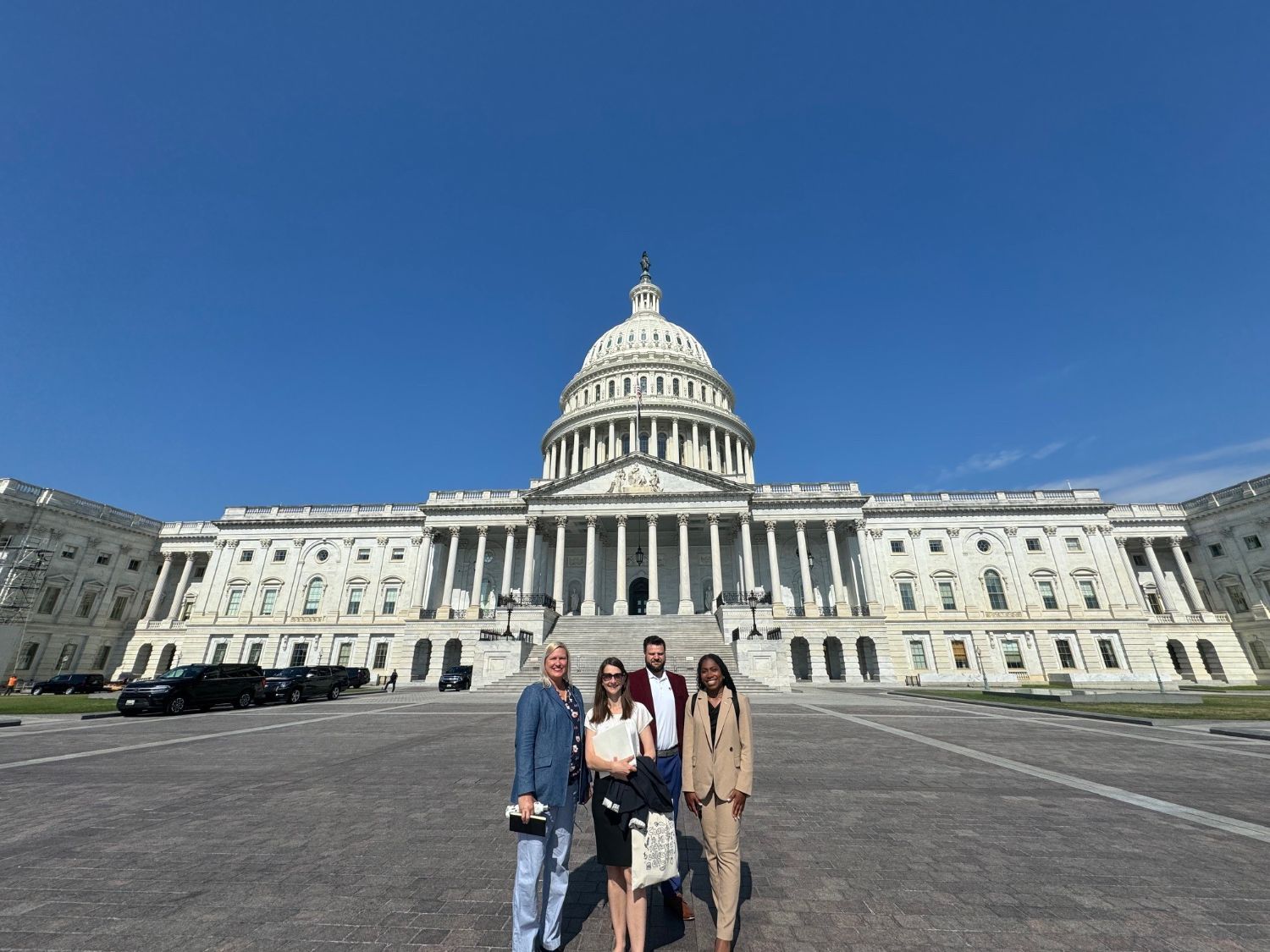 | | 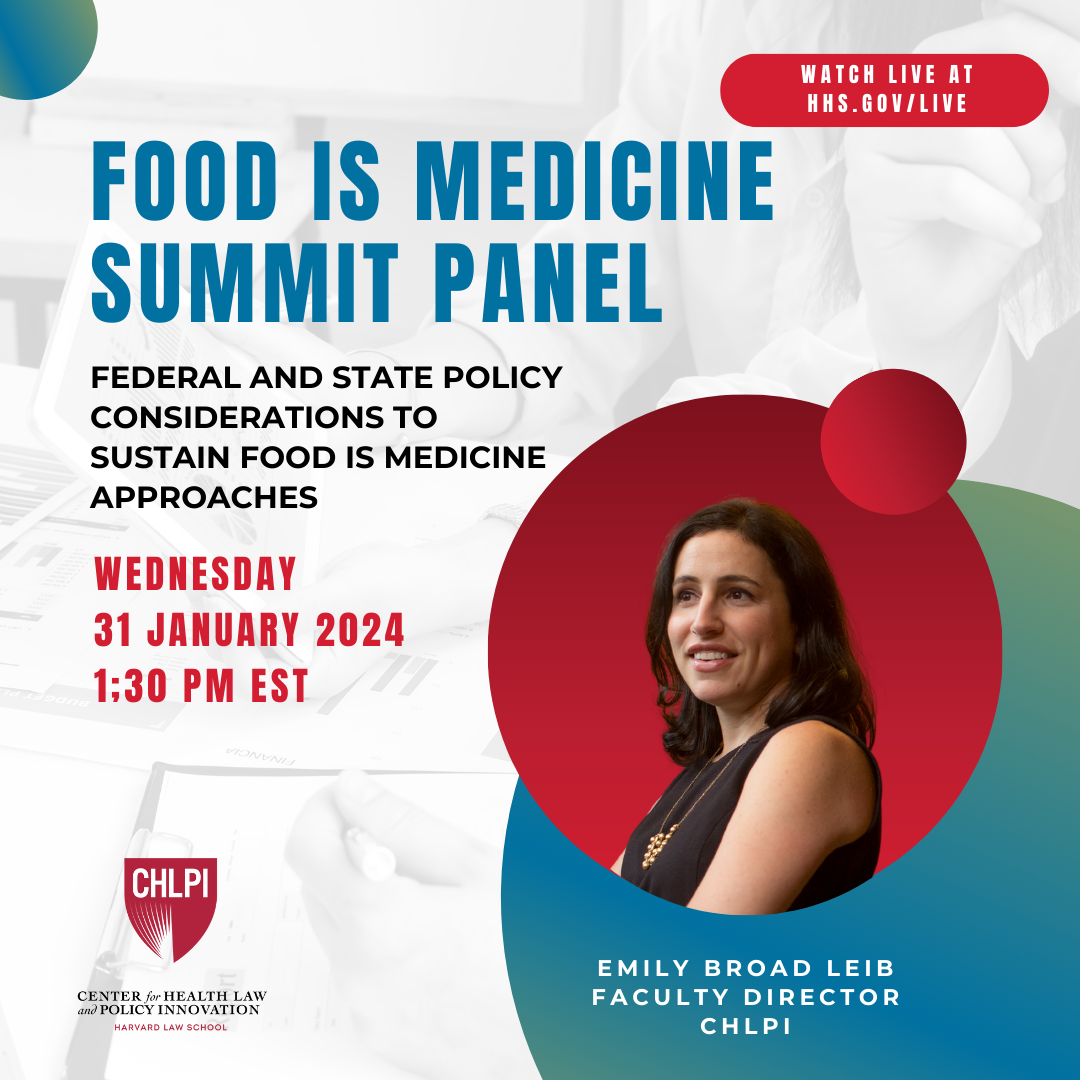 | First Ever Health and Human Services Summit on Food is Medicine In January 2024, the U.S. Department of Health and Human Services held its first ever summit on food is medicine. FLPC Faculty Director, Emily Broad Leib, spoke about key policy barriers and opportunities to creating a sustainable system for delivering nutrition interventions to patients with (or at risk of) diet-related health conditions, include the lack of nutrition education amongst health care professionals. |
|
|
| | | 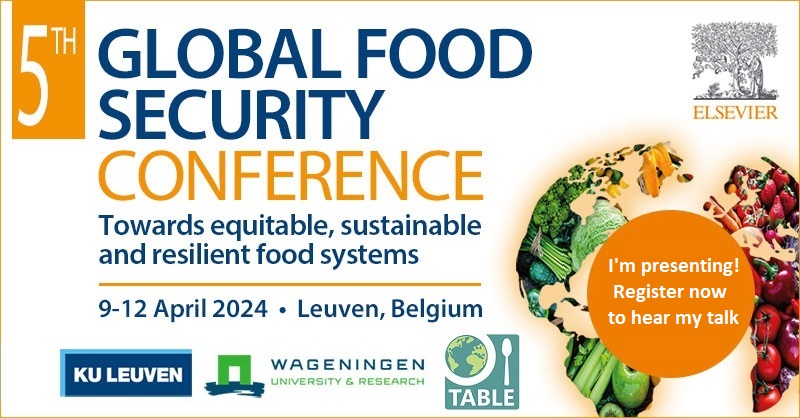 | | 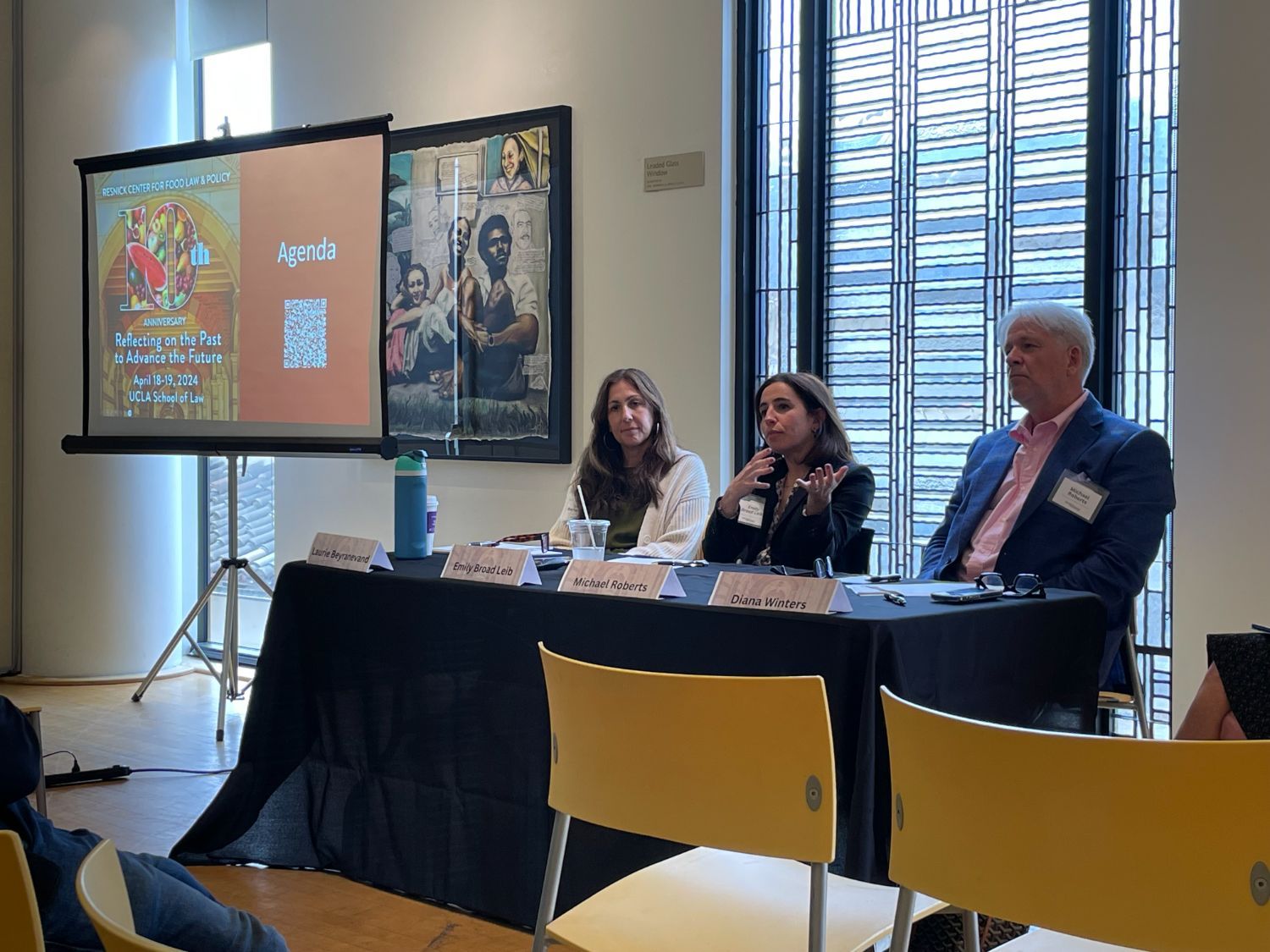 | The History of the Academic Discipline of Food Law At the Resnick Center for Food Law and Policy’s April 2024 conference celebrating the Center’s 10th anniversary, Emily Broad Leib, founder of the FLPC, joined panelists from the UCLA School of Law and Vermont Law School to talk about the relatively new and emerging legal discipline of food law. |
|
|
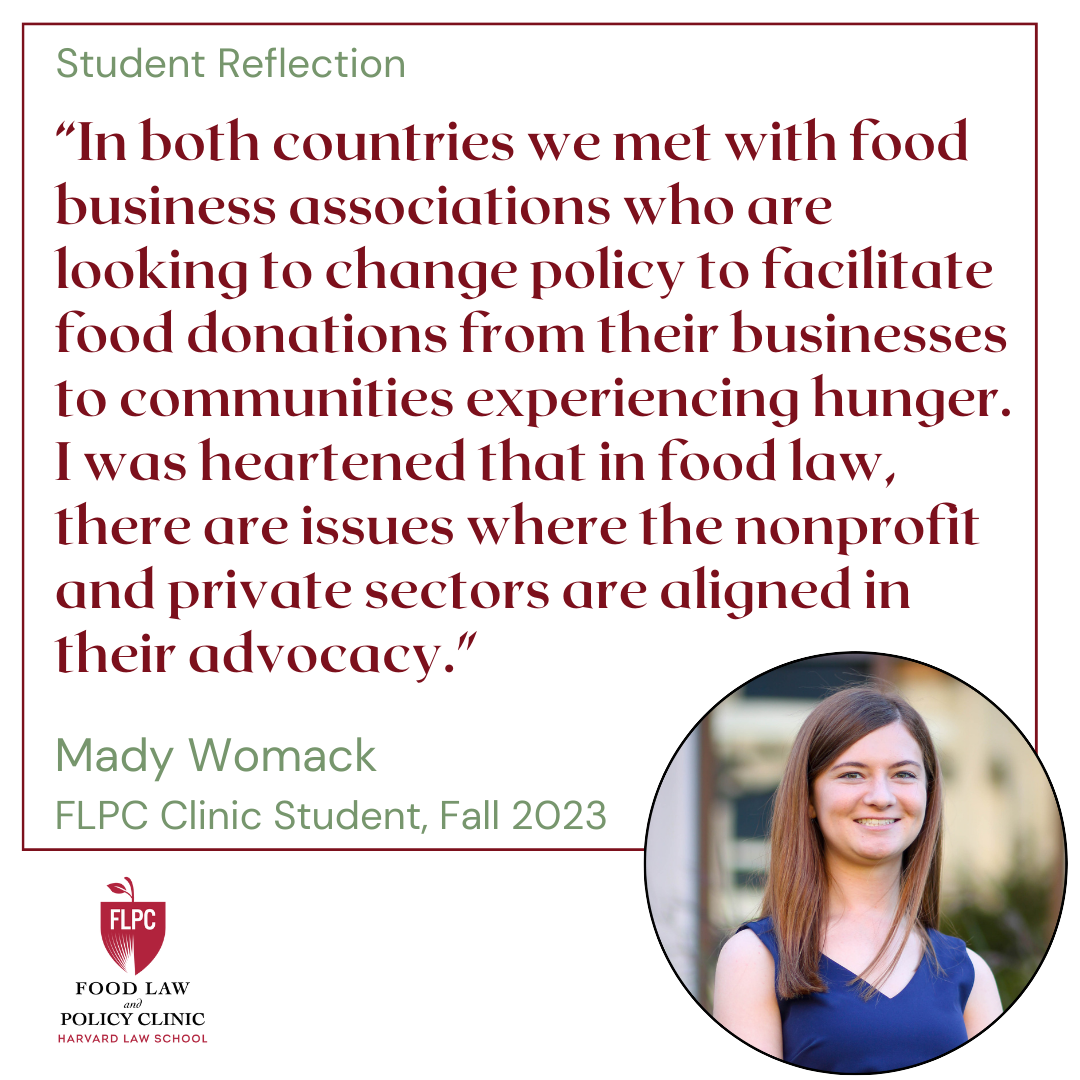 | On the Ground Assistance to South Africa Partners on Food Safety and Liability Protection for Food Donations Former FLPC students, Mady Womack and Kristen McEnroe, devoted their 2024 winter term to supporting FoodForward South Africa and the Consumer Goods Council of South Africa in moving forward food safety and liability protection policies that facilitate the donation of safe, edible food. During a January 2024 trip to South Africa, students and FLPC clinical staff met with partners and food business associations to delve into potential opportunities to improve related laws and policies. |
| 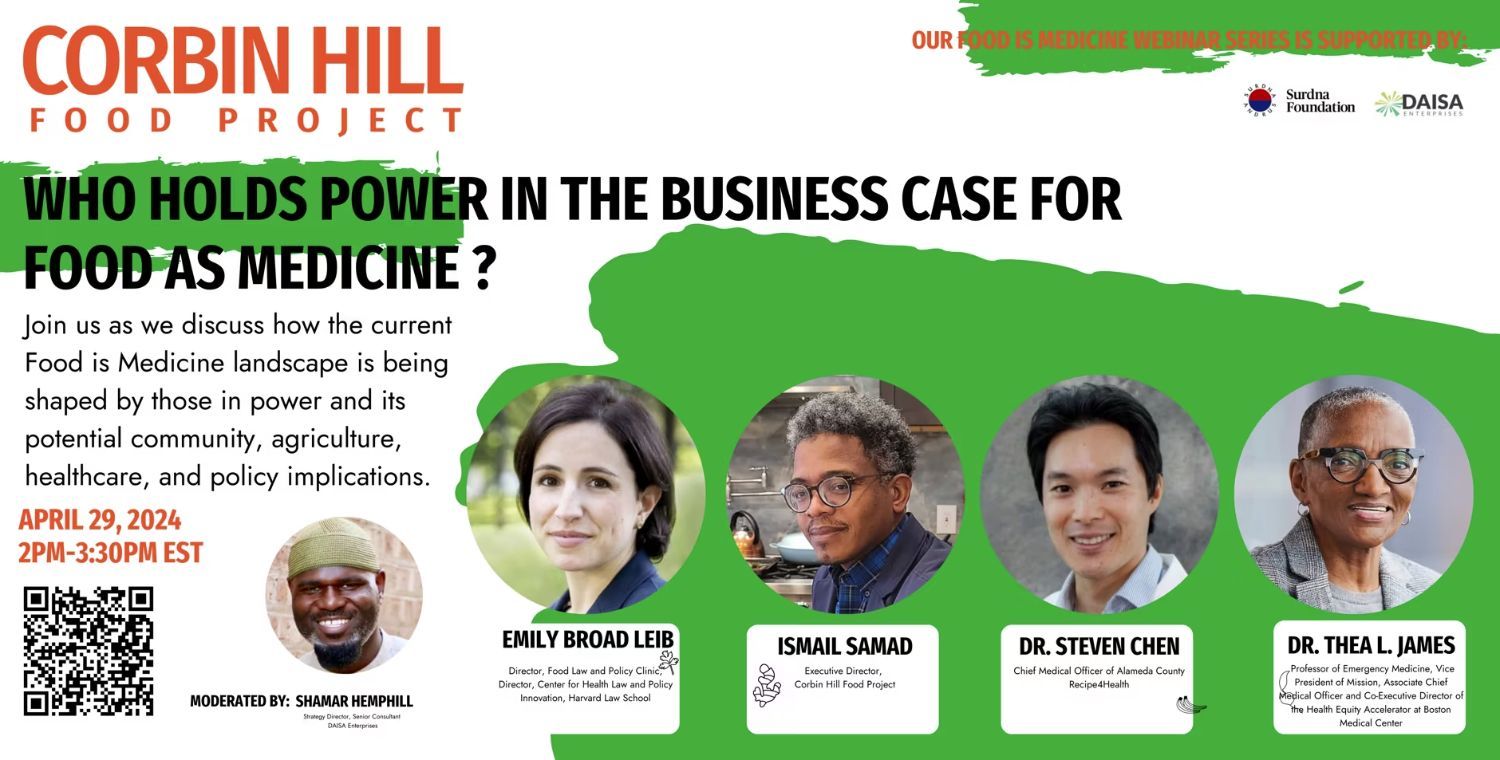 | Who Holds Power? In April 2024, Emily Broad Leib, Faculty Director of the Center for Health Law and Policy Innovation, joined Corbin Hill Food Project to talk about “Who Holds Power in the Business Case for Food As Medicine?” and how sharing power can lead to better outcomes for historically excluded communities. |
|
|
| | | |
|
| | | Asha McElroy empowers community members at Detroit Food Summit Former FLPC Intern Asha McElroy presented a talk titled "Bringing Rhythm, Soul and Flavor to the Voting Polls in 2023 and Beyond!" at the October 2023 Detroit Food Summit hosted by the Detroit Food Policy Council. As the Youth At-Large Council Representative, Asha spoke about the power of individual votes and different techniques to use collective power to influence food affordability and availability in the upcoming election cycles. Asha was a Dietetic Intern with Diversify Dietetics, and is now a Registered Dietitian at PACE Southeastern Michigan. |
|
|
| | | Join Our Team! Check out this job opening at the Food Law and Policy Clinic |
|
|
| Emma Scott Transitions from FLPC FLPC Associate Faculty Director and Clinical Instructor Emma Scott recently transitioned out of her role to join the Center for Agriculture and Food Systems (CAFS) at Vermont Law and Graduate School, as Director of the Food and Agriculture Clinic. We at FLPC are incredibly excited for this next chapter of Emma’s work, and grateful for all her salient contributions to the FLPC team in her time with us. We sat down with Emma to get her reflections on her time here and where she sees the food law and policy landscape heading to in the future. |
|
|
| Tori Oto rounds up Clinical Fellowship Clinical Fellow Tori Oto in June rounded up her two-year fellowship at the Food Law and Policy Clinic. Tori joined FLPC after earning her JD from Harvard Law School, and her fellowship focused on domestic food waste policy advocacy. We caught up with Tori for her insights into her time at FLPC. |
|
|
| Dr. Pinghui Xiao completes Visiting Fellowship at FLPC The Food Law and Policy Clinic welcomed Dr. Pinghui Xiao, Senior Lecturer, Law School, Guangzhou University, China, as a visiting scholar last spring. Prior to his current assignment, Xiao worked in the former China Food and Drug Administration (CFDA). He is Principal Investigator for two national research grants, which enable him to continue work on his publication series titled “Edible Internet” and “Digital Health.” |
|
|
| | |
|
| | | The Harvard Law School Food Law and Policy Clinic (FLPC) serves partner organizations and communities by providing guidance on cutting-edge food system issues, while engaging law students in the practice of food law and policy. FLPC’s work focuses on increasing access to healthy foods, supporting sustainable production and regional food systems, promoting community-led food system change, and reducing waste of healthy, wholesome food. FLPC is committed to advancing a cross-sector, multi-disciplinary and inclusive approach to its work, building partnerships with academic institutions, government agencies, private sector actors, and civil society with expertise in public health, the environment, and the economy. Learn more about FLPC. |
| | |
|
| |
|
|